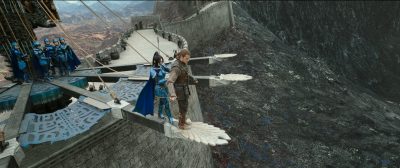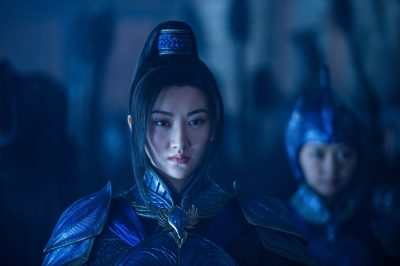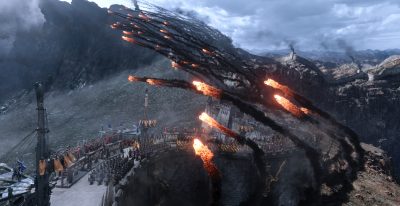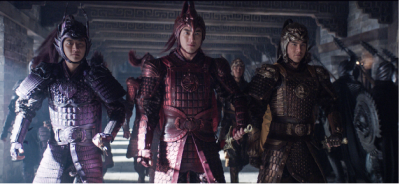
Global superstar MATT DAMON is William Garin in Legendary’s “The Great Wall.” Directed by Zhang Yimou (“Hero,” “House of Flying Daggers”) Universal Pictures.
Zhang Yimou’s The Great Wall is the first Chinese big budget movie that is targeted at a global audience. It has a number of Chinese stars and one major American star and tells a story that brings East and West cultures together in an uncomfortable co-operation against a foe that, should it feed enough, could put the entire world at risk.
With The Great Wall Zhang Yimou has become, in essence, the Chinese Cecil B. DeMille. He’s constructed an epic adventure with a cast of thousands. If the plot and dialogue aren’t always brilliant, the scale of the story and the action definitely make up for that – and it looks amazing!
The film opens with a small group of Europeans being chased by Asian bandits – apparently they’ve been after them for a while. A clever ruse allows the two survivors – William (Mark Damon) and Tovar (Pedro Pascal) – to escape – as far as a certain ginormous wall. During the opening scenes we learn that William and Tovar are in china seeking a mysterious ‘black powder.’
Between escaping and arriving at the wall, William kills strange creature – and keeps its hand/paw in hopes that someone will be able to identify what it is he’s just killed. That hand/paw saves their lives.

(L to R) JING TIAN as Commander Lin Mae and MATT DAMON as William Garin in Legendary’s “The Great Wall.” Directed by Zhang Yimou (“Hero,” “House of Flying Daggers”) Universal Pictures.
The wall is occupied by a giant army – members of the Nameless Order. Through the efforts of an earlier captured European, Ballard (Willem Dafoe), some of the Order’s leaders speak English – and they come to the conclusion that, however it happened, William did kill the beast.
After General Shao (Hanyu Zhang), Strategist Wang (Andy Lau) and Commander Lin Mae (Tian Jing) confer, instead of being killed outright, they are about to be locked up when the Tao Ties attack in force.
Commander Lin and William do not get off on the right foot – she would prefer to have him killed. If not for Strategist Wang, who sees proof of William’s kill in the fresh green blood on his sword, she would have gotten her way. In the battle, she begins to respect his abilities and vice versa.

JING TIAN is Commander Lin Mae in Legendary’s “The Great Wall.” Directed by Zhang Yimou (“Hero,” “House of Flying Daggers”) Universal Pictures.
After the first battle (the Tao Ties withdraw at dusk), William’s choice of bow is questioned and a quick display of skill earns more respect. Later, Ballard tells William and Tovar that he has a way to escape with enough black powder for seven armies and plans are made to escape during the beginning of the next battle.
But the Tao Ties turn out to be more intelligent than they were the last time they attacked, sixty years ago, and their tactics have changed.
William, having discovered that he likes having earned Lin Mae’s respect, decides to stay and fight for the right reasons. When he won’t go with them, they render him unconscious and leave. He, of course, is accused of helping until Peng (Lu Han) – a soldier whose life he had saved – to confer that he tried to stop his friends.
A chance discovery reveals just how smart the Tao Ties really are and it comes down to now General Lin Mae and William to prevent the destruction of the capitol (and save the world, but who’s counting…).

Legendary’s “The Great Wall” Stars global superstar Matt Damon and is directed by Zhang Yimou (“Hero,” “House of Flying Daggers”) Universal Pictures.
The Great Wall is a Chinese war movie on steroids – the use of hundreds (if not thousands) of extras gives it a scale that we equate with directors like Cecil B. DeMille. There’s plenty of distance fighting (arrows, catapults and such), but the sheer numbers of the Tao Ties soon force close combat.
The most intriguing to watch is the Crane Army – all female – that leaps from the wall, in harnesses, to drop upon the enemy and be pulled back up before the foe can strike back. Commander Lin leads them and it is here that William begins to appreciate her skills.
Then we see lots of flashy blade work, close quarters archery and general mayhem. We learn the Tao Ties are a hive mind – directed by a queen – and also that there’s a way to jam her communication with her armies. The use of black powder weapons takes on a much larger significance as we see how much more destructive they are compared to every other weapon available in that time period.
We watch as liar/thief/killer William becomes intrigued by the hard-edged Commander Lin and how neither Ballard not Tovar ever grows past their equally suspect backgrounds.

(L to R) PEDRO PASCAL as Pero Tovar and MATT DAMON as William Garin in Legendary’s “The Great Wall.” Directed by Zhang Yimou (“Hero,” “House of Flying Daggers”) Universal Pictures.
It’s not a case of the standard boy meets girl; boy loses girl; boy gets girl though. Instead, it’s about respect and growing trust between forced but very different allies, with very different backgrounds and skill sets.
Zhang treats every frame as though it is 100% essential to the storytelling – he frequently holds the frame and lets the action build within it. He has various units of the Nameless Order in different colors to make their ranks easy to follow (archers in red; infantry in gold; the all-female Crane Army in blue), and following the moving blocks of colors does make it easy for the audience to tell what’s going in even the most chaotic sequences.
When The Great Wall’s first trailer came out, there was a fear that the film would be focused on a white guy who saves the Chinese, but way the film plays out is significantly different.

Legendary’s “The Great Wall” Directed by Zhang Yimou (“Hero,” “House of Flying Daggers”) Universal Pictures.
Just as The Great Wall is a Chinese production with some Western co-operation, the story is about how a few Europeans interact with a Chinese army in an awkward co-operation. That co-operation plays throughout – right down to the key moments. Despite his best efforts, William is not the one who saves the day – though he certainly makes it possible for that to happen.
The script – by Carlo Bernard, Doug Miro and Tony Gilroy (story by Max Brooks, Edward Zwick and Marshall Herskovitz) – isn’t exactly brilliant, but it gives all the key characters, major and minor, distinct personalities and moments to shine.
If the dialogue is a bit clunky, it’s certainly saved by earnest performances that do get the requisite humor and drama across maybe a bit better than the lines deserve.
The Great Wall is a film that won’t win any major awards, but it’s just plain fun to watch.
Final Grade: B+